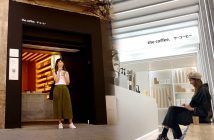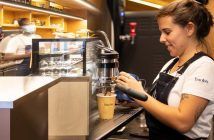The speed of network growth will depend on the country’s upcoming political-economic events
Marco Kerkmeester is a New Zealander who has a career in the army, studied chemistry in college, and worked for 10 years at IBM Asia Pacific in marketing, spending more time in an airplane than anywhere else. One day, in one of those exhaustive trips, he sat next to a Brazilian lady, also from the marketing area in a perfume packaging company.
They began to talk and, nine weeks later, became engaged and went to live together in Singapore and Australia. Since they wanted to start a family and Marco no longer had any pleasure in his work, they decided to move to Brazil, where the wife’s family is numerous and could help in the creation of the offspring.

Na loja do Santo Grão da Oscar Freire, é possível criar blends exclusivos e batizado-los com seu nome.
Once they got here, they did not know very well what they were going to do. He had in mind that he could act as a marketing consultant independently and felt that this was the most natural path for him. It was then that he wondered what really pleased him. Two things came to his mind: being in nature and living with spontaneous, transparent people. “The only person I am going to spend the rest of my life with is myself. So, where am I myself more than anywhere else?”, he thought.
When he was in Asia working, whenever he needed to make plans, he would leave the office and go to a coffee shop. “Caffeine helps one open the mind, and it is a place to make friends and close deals. I really like this environment.”
And then, in August 2003, with an investment of R$ 1.3 million, he opened his first point of sale, Santo Grão www.santograo.com.br, in the famous Oscar Freire in São Paulo. There was just a small problem: he did not understand anything about coffees. “I grew up on a farm in New Zealand and my mother would ring the bell at 10:00 a.m. and 3:00 p.m. so we could drink our soluble coffee. Only on Sundays, we would have real coffee, along with friends, who would come and visit us. So for me, coffee always represented that moment of stopping by, having a seat and exchanging ideas,” he says.

Santo Grão têm oito cafeterias em São Paulo e Curitiba.
When he opened the coffee shop, he was concerned about offering the best to his customers. He went out to look for good coffees in Brazil, and at that time, he did the job of a coffee hunter, where he met excellent producers. “The problem is that I would get to the farms to search for good coffee, I paid well, but no-one had heard about me. Very often, they would repeal me, thinking I was some crazy gringo,” he recalls.
He met Marcelo Vieira, from the Alfenas Farm, in Guaxupé, and bought his first 20 bags. After some time, he participated in competitions promoted by BSCA, as a coffee taster. He even became the cover of Vejinha. “I was ashamed at the time, I knew there were much better tasters than I,” he says.
He met Fábio Ruelas at the time, a taster at BSCA and, after leaving the association, established a partnership that has lasted to date, so that Fabio brought the best coffees to Santo Grão. “I believe in helping people enhance. We have a culture of integrity. The person who serves the table, is not a waiter, but an individual who has its traits. We only know how to work this way”, he emphasizes.
Only for the Santo Grão, Fábio receives 16 thousand samples of specialty coffees per year. There are 50 cups of coffee per day that are tasted and, of these, only 4% is approved.

O objetivo é criar uma rede com 80 lojas, inclusive fora do Brasil.
For several years, they partnered with Maruyama Coffees, a Japanese company, buying small batches of the Cup of Excellence winning coffees. “We wanted Brazilians to taste their best coffees, since until that moment, all the best coffees were going out, nothing was around here. I even bought coffee for R$ 4K a bag and my wife said I was crazy. Nevertheless, it was a great deal. It was a 93-point SCAA coffee, we sold five thousand cups at R$ 9.00 and we made R$ 45,000 in two months,” he recalls excitedly.
Brazilian Specialty Coffees
In Marco’s opinion, neither Brazil nor the world recognize the potential of the Brazilian specialty coffee. “Coffee is not a political plant, but a geographical one. Brazil is bigger than Ecuador, Colombia, Jamaica and so many other producers added. We have so many different terroirs and this has not yet been fully grasped. Producers need to better understand which plant goes best in what terroir. After all, I will not drink a Pinot Noir from Bordeaux. I will drink a Burgundy Pinot Noir. I am definitely going to have a Merlot from Bordeaux, then. So, it is necessary to understand which plant is best in a certain region, so that the best drink can be extracted”, he teaches. “The same thing has to happen to our coffees. It takes time and courage to experiment, but we have hidden gems here. And the market has not yet realized that,” he says.
Network growth
So far, Santo Grão with eight stores, had been growing in an organic, sustained manner, with its own financing, without third parties. Last year, it made R$ 34.4 million and this year, despite the crisis, expects to grow 12%, mainly with roasting. The network employs 250 direct employees. Each of its units is managed by a partner who started as a network contributor. “We are a coffee, but our biggest investment, without a doubt, is education. We want everyone working here to identify who they are in their essence and who have the courage to express their purposes. Only then can they grow, and so can we,” he says.

Marco Kerkmeester torce para que, em breve, o Brasil possa acabar com as barreiras à importação de grãos de café de outros países produtores.
In addition to the iconic Oscar Freire store, Santo Grão operates within the Villa’s bookstore in the Cidade Jardim, Higienópolis, Itaim, Morumbi, Moema, Vila Madalena and Curitiba shopping centers.
Marco acknowledges that so far, he had not been taken the franchise model into consideration as an option to grow. “I think I was not ready for that. But now, I am. I wish to open stores in other continents as well, and for that I will need investment. However, everything will depend on the unfolding of the Brazilian crisis”, ends.



